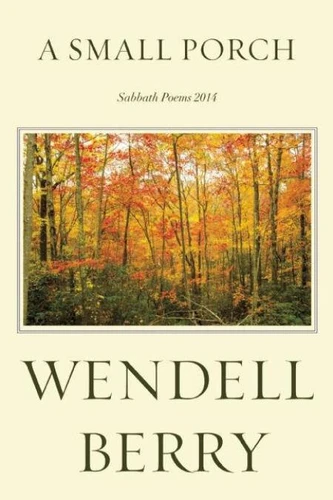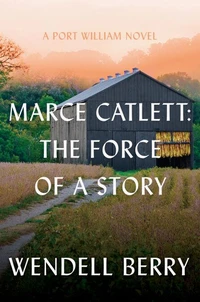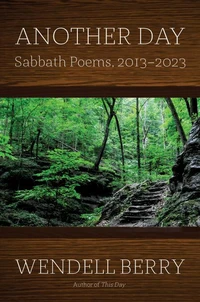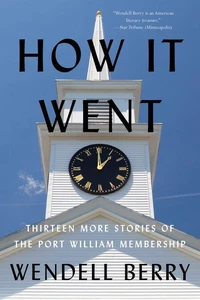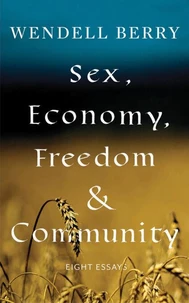A Small Porch. Sabbath Poems 2014 and 2015
Par :Formats :
Disponible dans votre compte client Decitre ou Furet du Nord dès validation de votre commande. Le format ePub protégé est :
- Compatible avec une lecture sur My Vivlio (smartphone, tablette, ordinateur)
- Compatible avec une lecture sur liseuses Vivlio
- Pour les liseuses autres que Vivlio, vous devez utiliser le logiciel Adobe Digital Edition. Non compatible avec la lecture sur les liseuses Kindle, Remarkable et Sony
- Non compatible avec un achat hors France métropolitaine
 , qui est-ce ?
, qui est-ce ?Notre partenaire de plateforme de lecture numérique où vous retrouverez l'ensemble de vos ebooks gratuitement
Pour en savoir plus sur nos ebooks, consultez notre aide en ligne ici
- Nombre de pages80
- FormatePub
- ISBN978-1-61902-803-6
- EAN9781619028036
- Date de parution01/06/2016
- Protection num.Adobe DRM
- Taille976 Ko
- Infos supplémentairesepub
- ÉditeurCounterpoint
Résumé
This collection of Wendell Berry poems and essays-written outdoors on the Sabbath-"[shines] with the gentle wisdom of a craftsman who has thought deeply about the paradoxical strangeness and wonder of life" (Christian Science Monitor)More than 35 years ago, Wendell Berry began spending his sabbaths outdoors, when the weather allowed, walking and wandering around familiar territory, seeking a deep intimacy only time could provide.
These walks sometimes yielded poems. Each year since, he has completed a series of these poems dated by the year of its composition. This new sequence provides a virtual syllabus for all of Berry's cultural and agricultural work in concentrated form. Many of these poems were written on a small porch in the woods, a place of stillness and reflection. Recently Berry has been reflecting on more than a half century of reading, to discover and to delight in the poetical, spiritual, and cultural roots of his work.
In The Presence of Nature in the Natural World, Berry's survey begins with Alan of Lille's 12th-century work, The Plaint of Nature. From the Bible through Chaucer, from Milton to Pope, from Wordsworth to the moderns, Berry's close reading is exhilarating. Moving from the canon of poetry to the sayings and texts found in agriculture and science, we gain new appreciation for the complexity of the issues faced in the 21st century by the struggling community of humans on earth.
With this long essay appended to these new Sabbath Poems, the result is an unusual book of depth and engagement. A new collection of Wendell Berry poems is always an occasion for celebration, and this eccentric gathering is especially so.
These walks sometimes yielded poems. Each year since, he has completed a series of these poems dated by the year of its composition. This new sequence provides a virtual syllabus for all of Berry's cultural and agricultural work in concentrated form. Many of these poems were written on a small porch in the woods, a place of stillness and reflection. Recently Berry has been reflecting on more than a half century of reading, to discover and to delight in the poetical, spiritual, and cultural roots of his work.
In The Presence of Nature in the Natural World, Berry's survey begins with Alan of Lille's 12th-century work, The Plaint of Nature. From the Bible through Chaucer, from Milton to Pope, from Wordsworth to the moderns, Berry's close reading is exhilarating. Moving from the canon of poetry to the sayings and texts found in agriculture and science, we gain new appreciation for the complexity of the issues faced in the 21st century by the struggling community of humans on earth.
With this long essay appended to these new Sabbath Poems, the result is an unusual book of depth and engagement. A new collection of Wendell Berry poems is always an occasion for celebration, and this eccentric gathering is especially so.
This collection of Wendell Berry poems and essays-written outdoors on the Sabbath-"[shines] with the gentle wisdom of a craftsman who has thought deeply about the paradoxical strangeness and wonder of life" (Christian Science Monitor)More than 35 years ago, Wendell Berry began spending his sabbaths outdoors, when the weather allowed, walking and wandering around familiar territory, seeking a deep intimacy only time could provide.
These walks sometimes yielded poems. Each year since, he has completed a series of these poems dated by the year of its composition. This new sequence provides a virtual syllabus for all of Berry's cultural and agricultural work in concentrated form. Many of these poems were written on a small porch in the woods, a place of stillness and reflection. Recently Berry has been reflecting on more than a half century of reading, to discover and to delight in the poetical, spiritual, and cultural roots of his work.
In The Presence of Nature in the Natural World, Berry's survey begins with Alan of Lille's 12th-century work, The Plaint of Nature. From the Bible through Chaucer, from Milton to Pope, from Wordsworth to the moderns, Berry's close reading is exhilarating. Moving from the canon of poetry to the sayings and texts found in agriculture and science, we gain new appreciation for the complexity of the issues faced in the 21st century by the struggling community of humans on earth.
With this long essay appended to these new Sabbath Poems, the result is an unusual book of depth and engagement. A new collection of Wendell Berry poems is always an occasion for celebration, and this eccentric gathering is especially so.
These walks sometimes yielded poems. Each year since, he has completed a series of these poems dated by the year of its composition. This new sequence provides a virtual syllabus for all of Berry's cultural and agricultural work in concentrated form. Many of these poems were written on a small porch in the woods, a place of stillness and reflection. Recently Berry has been reflecting on more than a half century of reading, to discover and to delight in the poetical, spiritual, and cultural roots of his work.
In The Presence of Nature in the Natural World, Berry's survey begins with Alan of Lille's 12th-century work, The Plaint of Nature. From the Bible through Chaucer, from Milton to Pope, from Wordsworth to the moderns, Berry's close reading is exhilarating. Moving from the canon of poetry to the sayings and texts found in agriculture and science, we gain new appreciation for the complexity of the issues faced in the 21st century by the struggling community of humans on earth.
With this long essay appended to these new Sabbath Poems, the result is an unusual book of depth and engagement. A new collection of Wendell Berry poems is always an occasion for celebration, and this eccentric gathering is especially so.

